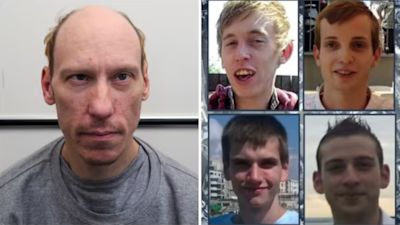Stephen Port: Police watchdog to re-open investigation into Met’s response to serial killer

Jack Taylor was the last of Stephen Port's victims and his sisters fought tirelessly for justice - they told ITV News what they made of the new investigation
The police watchdog is to reinvestigate the Metropolitan Police over their handling of the inquiry into the murders of four young men by serial killer Stephen Port.
The Independent Office for Police Conduct said it will now look into how Scotland Yard investigated the cases during Port’s killing spree in Barking, east London, from June 2014 to September 2015, after none of the 17 officers involved in the case faced disciplinary action.
Jurors at the inquests into the deaths of Anthony Walgate, 23, Gabriel Kovari, 22, Daniel Whitworth, 21, and 25-year-old Jack Taylor concluded that police failings “probably” contributed to the deaths of the three last victims, all of whom were unlawfully killed.
The jury’s findings, in December last year, prompted the IOPC to announce that it would consider reinvestigating.
'Hindered by a wall of silence'
Speaking on behalf of the families, solicitor Neil Hudgell said:
"This was the only logical decision open to the IOPC following the weight of evidence heard at the inquests last year.
"The original IOPC report was hindered by a wall of silence, given that all but one of the 17 officers questioned gave ‘no comment’ interviews. Our hope now is that the IOPC will have a lot more to go on.
"There remains a big question mark over whether police prejudice played a part in the investigations.
"During the inquests, the police attempted to brief the media that the coroner had found no evidence of homophobia, which is simply not true.
"The coroner did not ask the inquest jury to make findings of prejudice at the request of the police."
'Families left traumatised'
Mr Hudgell added the families believed police’s actions were, in part, driven by homophobia.
"Had four, white, heterosexual girls been found dead in the same manner as Anthony, Gabriel, Daniel and Jack, then the police’s actions, and the likely outcomes, would have been different," he said.
The families' legal team explained how they were left "traumatised" by their treatment at the hands of the police.
Mr Hudgell said: "The inadequate investigations by the Metropolitan Police into the four deaths is one of the most widespread institutional failures in modern history, exacerbated by a woeful lack of remorse, regret or sympathy displayed at the inquests by some of the officers involved."
Port's victims - Anthony Walgate, 23, Gabriel Kovari, 22, Daniel Whitworth, 21, and Jack Taylor, 25, were all found dead near the killer's east London flat.
The inquest jury found that officers in Barking missed repeated opportunities to catch Port after he plied his first victim, Mr Walgate, with a fatal dose of the date-rape drug GHB and left his body in a graveyard.
Port struck three more times before he was finally caught, killing each victim in near-identical circumstances, with police failing to link him to the deaths despite detective work carried out by the victims’ family and friends that would lead them to the culprit.
Officers had denied accusations of prejudice and homophobia, instead blaming mistakes on being understaffed and lacking resources, with some acting up in senior positions.
Responding to the the new police watchdog investigation the Met Police aid it would offer "every support".
"We are deeply sorry there were failings'
Acting Deputy Commissioner Helen Ball said: "The deaths of these four young men is a tragedy and we are deeply sorry there were failings in our police response. Again, I give my own and the Met’s heartfelt apologies.
"The whole of the Met is committed to improving our investigations, our relationships and the trust people have in us to keep them safe.
"Since the deaths of Anthony, Gabriel, Daniel and Jack we have worked hard to ensure the service we provide is better while understanding we have more to do.
"Learning and recommendations from the Independent Office for Police Conduct, Her Majesty’s Coroner and our LGBT+ Independent Advisory Group of community members have enabled us to make a range of improvements."
Graham Beesley from police watchdog, the IOPC added:
"A matter can only be reinvestigated by the IOPC if we are satisfied that the original investigation was materially flawed in a manner which had an impact on the subsequent decisions made on discipline, performance and/or referral to the Crown Prosecution Service, and/or there is ‘significant new information’ that requires further investigation.
"There must be a real possibility that the new information, had it been available, would have led wholly or partly to different decisions on the outcomes of our investigation. Lastly, it must be considered in the public interest to reinvestigate.
"In this case, the reinvestigation process has identified evidence which meets both the significant new information and material flaw categories, and we believe a proportionate - but thorough - new investigation is in the public interest."
Stephen Port, 46, a bus depot chef, will die in prison after being handed a whole life sentence at the Old Bailey for the murders and a string of sex assaults.
Want a quick and expert briefing on the biggest news stories? Listen to our latest podcasts to find out What You Need To Know...